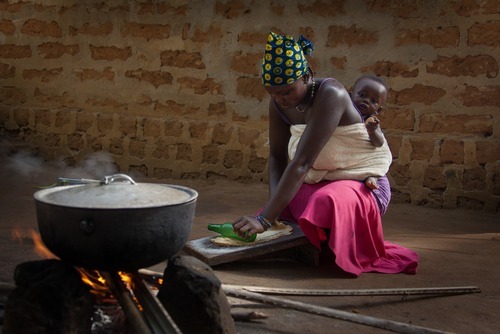

Sierra Leone has been described as one of the worst places in the world to become a mother. The country is battling some of the highest maternal mortality rates in the world, with mothers often having to walk long distances to get to a maternity facility. Funded by the European Union (EU), the United Nations Children's Fund (UNICEF) is investing in district hospitals, health centres and health posts that will potentially benefit 1.25 million women of child-bearing age and 676,000 children under five.
Eight months pregnant with her third child, Bakey Kamara’s antenatal check-ups are a two mile walk from her home. The appointments are at the Konsho Community Health Post, a newly upgraded centre, with a new maternity unit. The 25-year-old is grateful for the new facility: “I’m glad for this new building and everything in it. It really looks different and nicer than what we had before.”
Many other pregnant women living in remote areas of Sierra Leone lack the financial means and transportation to access the care they need for a safe delivery. Others manage to access hospitals, but discover the units lack essential resources.
Last year Mamie Moriba, 30, was admitted to a local hospital at nine months pregnant, with typhoid. She died due to a lack of medication and functioning phones.
The initiative includes the renovation of infrastructure and the provision of equipment in existing hospitals, as well as the construction of new hospitals and rural health posts. The plan is also to upgrade medical stores to allow for free health care and other health and nutrition supply storage, new maternity and paediatric wards, and improved staff quarters.
Led by the Ministry of Health and Sanitation, the work was carried out with funding of around EUR 4.4 million (approx. USD 4.7 million) from the European Union as part of a multi-year EUR 23 million (approx. USD 24.6 million) EU grant to help the government improve child and maternal health.
Other parts of the grant have been used to support the Free Health Care programme. Funds will also invest in the training of health staff, and improve health sector governance.
This year, UNICEF will also complete two training schools for Maternal Child Health Aides. That is in addition to a large paediatric hospital in the district of Kailahun.
His Excellency Dr. Ernest Bai Koroma, President of the Republic of Sierra Leone, extended his gratitude to the EU at the recent inauguration of 47 newly constructed and rehabilitated health structures across 11 districts. “When we improve on the health sector, all other things will improve. That is why we are attaching so much importance to it. This is our programme and we are committed to it,” he said.
Nurse Zainab Titi Sawaneh started working at Konsho Community Health Post in 2012. The labour ward initially had no delivery bed, electricity or running water. The unit was recently moved to the new maternity building. It now has a good water and electricity system.
"I think if women agree to come for their antenatal care, accept to come to clinics for delivery and decide to stop that home delivery, this will help to reduce the maternal mortality rates," she said. "Because of this new facility now I have more zeal to do my work."
It is hoped that through initiatives like these, more Sierra Leonean mothers will be provided with the medical attention they need.
Sources:
http://www.sierraloaded.com/sierra-leone-the-most-dangerous-place-in-the-world-to-become-a-mother/